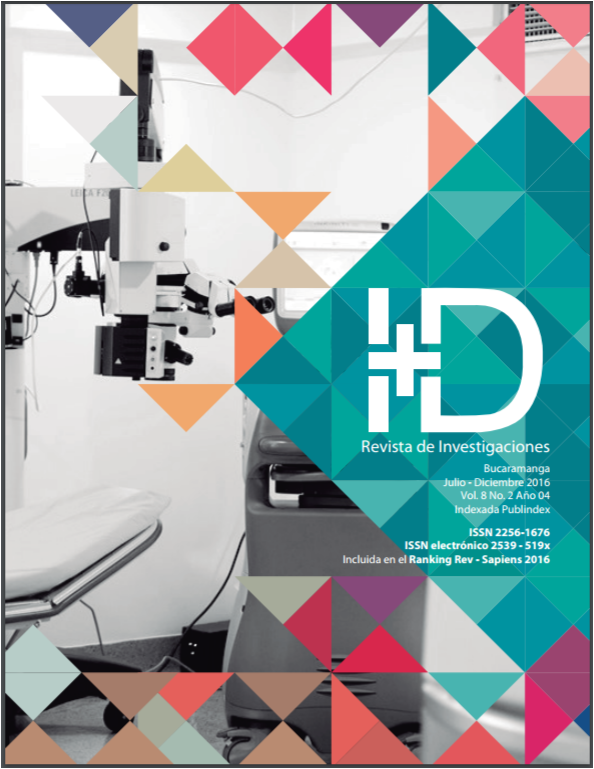The smallholding land use as central axis of the rural pre agreement between the Colombian government and the FARC. Preliminary theoretical and practical feasibility
DOI:
https://doi.org/10.33304/revinv.v08n2-2016003Keywords:
Agrarian reform, Concordances, Feasibility, Relevant pre agreements, SmallholdingsAbstract
The colombian civil war should not have any structural justification at least in agrarian problems solutions. The article demonstrates it analyzing the Number One point of the preliminary agreement between the Colombian government and the insurgent faction FARC, named “Política de desarrollo agrario integral”. The basic hypothesis exposes the risk of this agreement in maintain the actual smallholding agrarian exploitations and so the structural contradictions to maintain rural poverty which conduced to political violence. First it compares the text of the pre agreement with legal agrarian reforms Laws 200 of 1936 and 135 of 1961 defining their levels of concordance. Second, it demonstrates the lack of any cualitative or cuantitative differences between this preliminary agreement and the principal legal and conceptual agrarian reforms which has been applied (and failed) in Colombia from the begining of the 20 century. So, it generates some conclusions and recomendations suggesting that this paradox should demonstrate that colombian civil war between Stablishment and Insurgence did not have any structural opposition about this essential agrarian policies because both of them agrees in repeating all the historical failed agrarian strategies actions which conduced to the civil war as well as this is presented as the way to negotiate the war`s ending.Downloads
References
Berry, A. (2002). ¿Colombia encontró por fn una reforma agraria que funcione? Revista de Economía Institucional, 4 (6), pp. 25-70.
Berry, A. (2013). Se necesita un gran cambio a favor de la pequeña agricultura en Colombia. Cali. Recuperado de www.eltiempo.com
Berry, A. (2015). ¿Cómo acabar con la pobreza y bajar la desigualdad? (Ponencia en el foro sobre el Desarrollo Social para el post conflicto). Bogotá: Universidad Jorge Tadeo Lozano. Recuperado de www.utadeo.edu.co Castro, P. (1972). Un campesino previno al país. Bogotá: Tercer Mundo.
Congote, B. (2004). Anatomía religiosa de la guerra (Tesis de Maestría). Universidad de los Andes. Bogotá.
Congote, B. (2011a). “Tres lecturas sobre la depredación del ecosistema. El caso de Colombia”. Revista Tecnogestión, 8, pp. 67-81.
Congote, B. & García. J. (2014). Dos hipótesis sobre el efecto que tiene en la forma de explotación agropecuaria aplicar subsidios a sistemas de riego. El caso del Alto Chicamocha (Boyacá, Colombia). Bogotá: Revista Cuadernos de Economía 33 (62), enero-junio de 2014.
Congreso de la Republica de Colombia. (diciembre 16 de 1936) Sobre régimen de tierras. [Ley 200 de 1936].
Congreso de la Republica de Colombia. (diciembre 20 de 1961) Sobre reforma social agraria. [Ley 135 de 1961].
Contreras, S. (1971). “Política agraria colombiana. Crítica a la luz del método de Marx y del concepto de racionalidad económica”. Bogotá: Universidad Nacional de Colombia.
Currie, L. (1968). Desarrollo económico acelerado. México, D. F.: FCE.
Deas, M. (2015). (21 de julio de 2015). “Sobre la paz”. Diario El Tiempo. Recuperado de http://www.eltiempo.com/
Faguet, J., Sánchez, F. y Villaveces, J. (2015). “Land Reform, Latifundia and Social Development at Local Level in Colombia, 1961-2010”. Bogotá: CEDE (06).
García, J. (2011). Perspectivas del desarrollo en la región del Alto Chicamocha (Tesis de maestría). Universidad Pedagógica y Tecnológica de Colombia (UPTC),Tunja.
Gobierno de Colombia y Fuerzas Armadas Revolucionarias de Colombia (FARC). (2014). Informe Conjunto de la mesa de conversaciones entre el Gobierno de Colombia y las Fuerzas Armadas Revolucionarias de Colombia – Ejército del Pueblo, FARC-EP. Bogotá: periódicos de mayor circulación nacional.
Keynes, J., (1970) [1936]. Teoría general de la renta, el interés y el dinero. México: FCE.
Marx, K. (1989) [1857]. Introducción a la crítica de la economía política. Bogotá, Buenos Aires, Madrid, México: Siglo XXI.
Restrepo, J. (2015).La propiedad rural. Revista Economía Colombiana. Recuperado de www.contraloriagen.gov.co
Sánchez, G. (1985). Ensayos de historia social y política del siglo XX. Bogotá: Áncora.
Sánchez, G. (1999). “Guerra y política en la sociedad colombiana”. Revista de Análisis político, (11).
Sánchez, G. y Meertens, D. (2000). Bandoleros, gamonales y campesinos. Bogotá: Áncora.
Sandilands, R. (1971). “La modernización del sector agropecuario y la migración rural-urbana en Colombia”. Revista de Planeación y Desarrollo, 3 (3), pp. 25-57.












